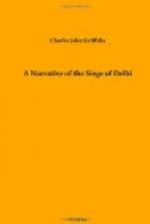September 7.—From the night of September 7 to the day of assault all the artillerymen in the force, European as well as native, were constantly employed in the batteries and trenches. Day and night officers and men worked with unflagging energy in the advanced batteries, with no relief and no cessation from their toil. Few in number, worn out by the excessive fatigues of a three months’ campaign, and enervated by continuous work in the deadliest season of the year, these gallant European artillerymen earned during those last days of the siege, by their zeal and devotion, the heartfelt thanks of the whole army. The old Bengal Artillery have a splendid roll of services, extending for upwards of 100 years; still, in the annals of that distinguished regiment there is no brighter record than their achievements before Delhi in 1857. The corps has been merged into the Royal Artillery, but the ancient name still lives in the memory of those who were witnesses of their deeds, and their imperishable renown adds greater lustre to the proud motto, Ubique, borne by the regiment to which they are affiliated.
Many officers and men of the cavalry and infantry volunteered for service in the batteries when called on by the General. They acquitted themselves well, were of great use to the gunners in lightening the arduous duties, and were complimented in orders for the valuable aid they had afforded to their companions in arms.[1]
September 11.—The advanced batteries were all completed by the evening of September 11, when the actual bombardment of the city began. For three days and nights previous No. 1 Battery, on the extreme right, was severely pounded from the Mori bastion and Kishenganj, but when the guns got into full play the fire from the former grew gradually weaker and weaker, till it was completely overpowered. Nos. 2 and 4 Batteries, being nearer to the walls, suffered much from the enemy, and the losses were very severe both among the artillery and the covering and working bodies of infantry.
September 11.—At length, on September 11, the whole of our batteries opened fire simultaneously on the city bastions and walls. The Kashmir bastion was soon silenced, the ramparts and adjacent curtains knocked to fragments, and a large breach opened in the walls. On the extreme left, at the Custom-House, our battery, as before related, was only 180 yards from the city, and the crushing fire from this, when in full play, smashed to pieces the Water bastion, overturned the guns, and made a breach in the curtain so wide and practicable that it could be ascended with ease.
Fifty guns and mortars were now pouring shot and shell without a moment’s interval on the doomed city. The din and roar were deafening; day and night salvos of artillery were heard, roll following roll in endless succession, and striking terror in the hearts of those who knew and felt that the day of retribution was at hand.




